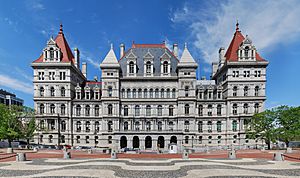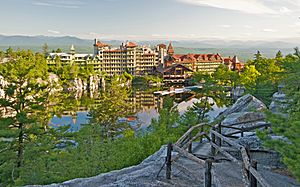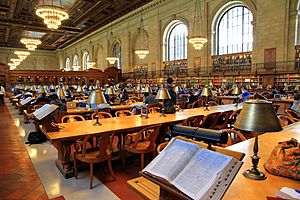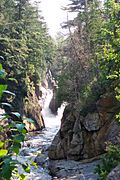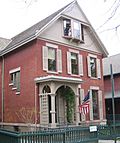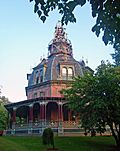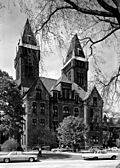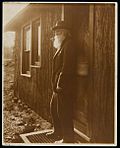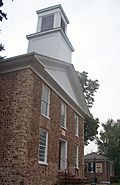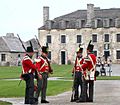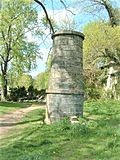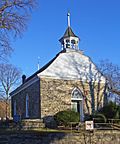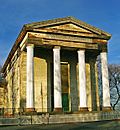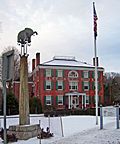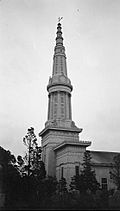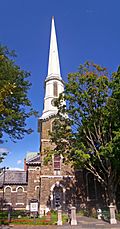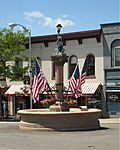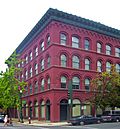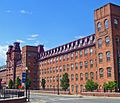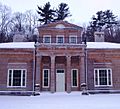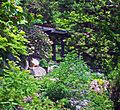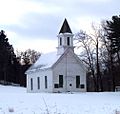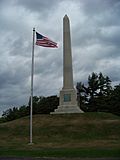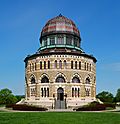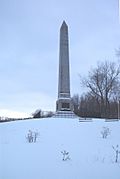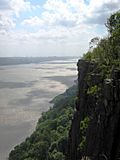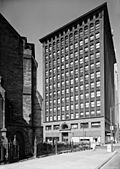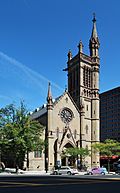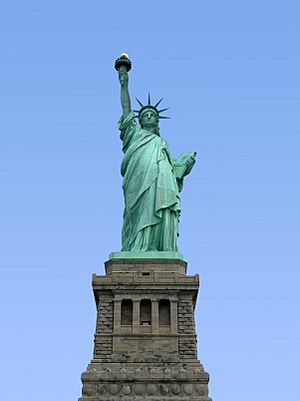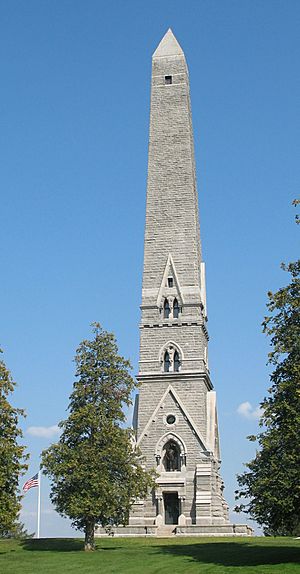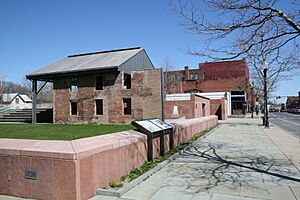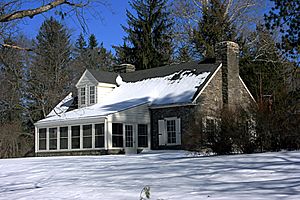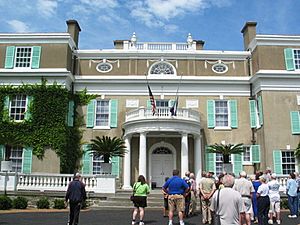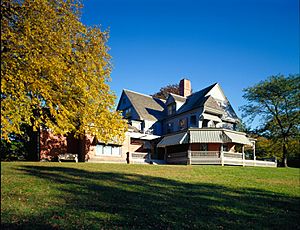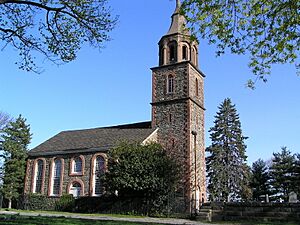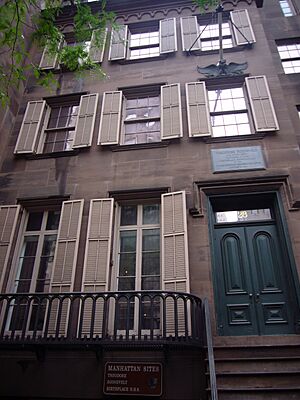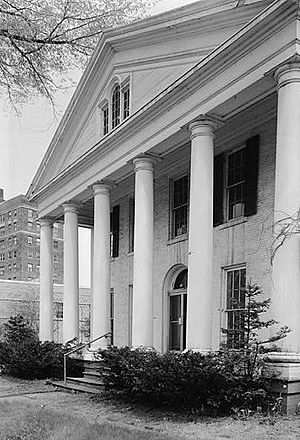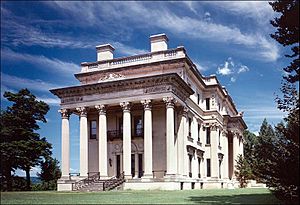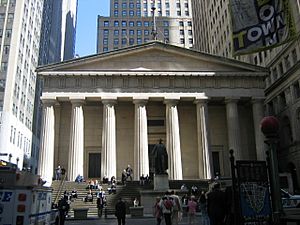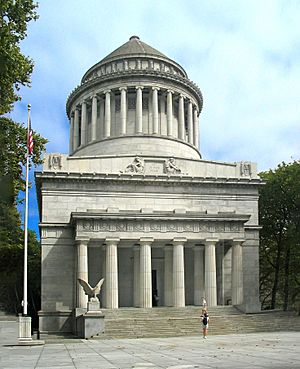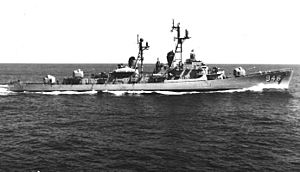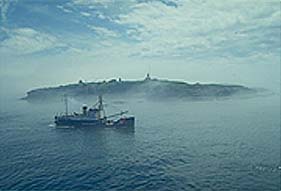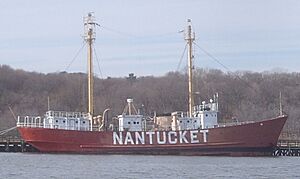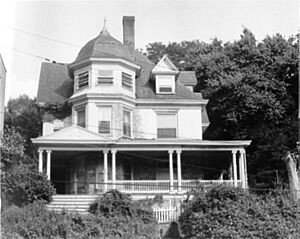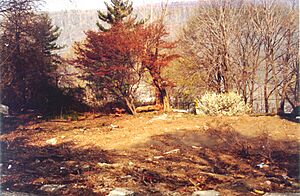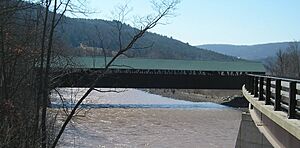List of National Historic Landmarks in New York facts for kids
This article lists special historic places in New York State that the U.S. government has recognized. These places are called National Historic Landmarks (NHLs). The National Park Service chooses these landmarks because they are very important to the history of the United States.
New York State has 276 NHLs, which is more than any other state! This is over 10% of all the NHLs in the whole country. The National Park Service also lists 20 other historic sites that are super important, and 7 of these are also NHLs. This list includes all of them.
About half of New York's NHLs (139) are in upstate New York. Another 13 are on Long Island, and 116 are in New York City. Some counties have many NHLs, like Manhattan (86), Westchester County (18), and Erie County (10). The first NHLs in New York were chosen on October 9, 1960. The newest one was added on January 13, 2021. The NHLs outside New York City are listed below. The ones in New York City are in a separate article.
Seven of these NHL sites are also part of the National Park System in New York. The other 13 National Park Service areas are also historic but don't need NHL status because the government already protects them. This article also lists three places that used to be NHLs in New York but are no longer.
Contents
- What Makes a Place a National Historic Landmark?
- National Historic Landmarks in Upstate New York and Long Island
- National Historic Landmarks in New York City
- Historic Places in the National Park System
- Former National Historic Landmarks in New York
- Sites No Longer National Historic Landmarks in New York
- See Also
What Makes a Place a National Historic Landmark?
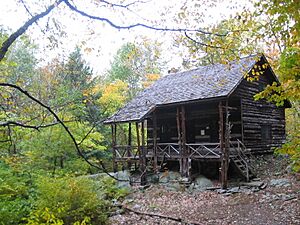
New York's National Historic Landmarks include many different types of places. There are 10 very old archeological sites from long ago. You can also find 12 old Dutch farmhouses and historic neighborhoods. Plus, there are 21 churches or places of worship that are important for their history or architecture.
Many NHLs (26) are related to military history. These include 13 old forts (some still standing, some ruins), 5 battlegrounds, and 7 military buildings. Most of these military sites are from the French and Indian War or the American Revolutionary War. Only one is from the American Civil War.
There are also 9 NHL ships! These include a warship and a tugboat from World War II, a warship from the Vietnam War, and several sailing boats and fireboats. You'll also find 24 grand mansions and 4 sites famous for their beautiful gardens. Many thousands of buildings are part of New York's 9 National Historic Landmark Districts.
Many NHLs are linked to smart people and their inventions. There are 22 sites connected to intellectual achievements. This includes 9 university buildings and 10 places linked to inventors or scientists. Four are engineering marvels, like two bridges that were once the longest of their kind.
New York's business history is also recognized. There are 11 historic skyscrapers, with 5 that were once the tallest in the world. Seven buildings are important for business history, like stock exchanges. There are also 2 old bank buildings, 5 industrial factories, and 3 water-based engineering projects. Some buildings are even famous for being architecturally unique!
Many NHLs show important political and social changes. Four are former mental health hospitals, showing New York's early work in mental health care. There are 14 sites linked to suffragettes (women who fought for voting rights) and other women leaders. Five sites are connected to the Underground Railroad or people who fought to end slavery. Six sites are important for African-American leaders, and three are about labor rights. Four sites are linked to other social movements.
You can also find 21 homes of other national leaders and 6 important government buildings. For community and arts, there are 2 utopian communities, the Adirondack Park and 4 of its "Great Camps," and 5 other retreat places. At least 9 artist homes or studios are landmarks, along with 9 homes of writers and composers. There are 4 club buildings (two are historical societies) and 8 entertainment places. Sixteen other sites are unique and hard to put into a category.
Many famous architects designed buildings that became NHLs in New York. These include Alexander Jackson Davis, Andrew Jackson Downing, William West Durant, and others. The firm McKim, Mead, and White designed at least six NHL buildings. Their work on Pennsylvania Station in 1963, which was going to be torn down, actually started a big movement to save historic buildings in New York City. This led to the creation of the New York City Landmarks Preservation Commission in 1965.
National Historic Landmarks in Upstate New York and Long Island
New York State, outside of New York City, has 155 of these special landmarks. Some of these are also State Historic Sites (SHS) or National Park System areas. These are marked in the list.
- Key
| National Historic Landmark | |
| † | National Historic Landmark District |
| ∞ | National Memorial |
| * | National Historic Site |
| National Monument | |
| National Historical Park | |
| Delisted landmark |
| Landmark name | Image | Date designated | Location | County | Description | |
|---|---|---|---|---|---|---|
| 1 | Adams Power Plant Transformer House |
(#75001212) |
Niagara Falls 43°04′54″N 79°02′34″W / 43.081764°N 79.042836°W |
Niagara | This building was part of the world's first large power plant that used alternating current. It got power from Niagara Falls. | |
| 2 | Adirondack Forest Preserve |
(#66000891) |
Northeastern Upstate New York 43°47′13″N 74°29′06″W / 43.786958°N 74.485016°W |
All of Essex and Hamilton and parts of Clinton, Franklin, Fulton, Herkimer, Lewis, Oneida, St. Lawrence, Saratoga, Warren, and Washington | This is the largest protected natural area in the lower 48 United States. It was created in 1885 and is protected by New York's constitution. | |
| 3 | Susan B. Anthony House |
(#66000528) |
Rochester 43°09′12″N 77°37′33″W / 43.153336°N 77.625747°W |
Monroe | This was the home of Susan B. Anthony, a very important leader in the women's rights movement in the 1800s. | |
| 4 | Armour-Stiner House |
(#75001238) |
Irvington 41°01′51″N 73°52′13″W / 41.030803°N 73.870415°W |
Westchester | This unique house is shaped like an octagon, following architectural ideas from Orson Squire Fowler. | |
| 5 | Bennington Battlefield |
(#66000564) |
Walloomsac 42°56′19″N 73°18′16″W / 42.938658°N 73.304418°W |
Rensselaer | This is where American soldiers defeated a British group. This victory helped the Continental Army win the important Battle of Saratoga. | |
| 6 | Boston Post Road Historic District |
(#82001275) |
Rye 40°57′31″N 73°42′07″W / 40.958487°N 73.701922°W |
Westchester | This district includes three large mansions and their lands. It also has the childhood home of John Jay, a Founding Father. | |
| 7 | Boughton Hill (Gannagaro) |
(#66000559) |
Victor 42°57′40″N 77°24′46″W / 42.961157°N 77.412736°W |
Ontario | This is the site of a 17th-century Seneca village. It was known as the Town of Peace and is where the Iroquois Confederacy began. | |
| 8 | Bronck House |
(#67000012) |
Coxsackie 42°20′31″N 73°50′55″W / 42.342052°N 73.848724°W |
Greene | This is the oldest building in upstate New York. It's a great example of old Dutch colonial architecture. | |
| 9 | Dr. Oliver Bronson House and Estate |
(#03001035) |
Hudson 42°14′35″N 73°47′09″W / 42.243119°N 73.785764°W |
Columbia | This house is an early example of the Hudson River bracketed style by architect Alexander Jackson Davis. | |
| 10 | John Brown Farm and Gravesite |
(#72000840) |
Lake Placid 44°15′20″N 73°58′15″W / 44.255574°N 73.970969°W |
Essex | This is the home and burial place of John Brown, a famous person who fought against slavery. He was executed for his raid on Harper's Ferry Armory. | |
| 11 | Buffalo and Erie County Historic Society Building |
(#80002606) |
Buffalo 42°56′08″N 78°52′36″W / 42.935556°N 78.876667°W |
Erie | This building looks like an ancient Greek temple. It was built for the 1901 Pan-American Exposition and later became a historical society. | |
| 12 | Buffalo State Hospital |
(#86003557) |
Buffalo 42°55′46″N 78°52′56″W / 42.929382°N 78.882147°W |
Erie | This is the largest project by architect H. H. Richardson. It was used to care for people with mental illness, and its grounds were designed by Frederick Law Olmsted. | |
| 13 | John Burroughs' Riverby Study |
(#68000035) |
West Park 41°48′00″N 73°57′32″W / 41.8°N 73.958889°W |
Ulster | This small building was built in 1881 by naturalist John Burroughs as a quiet place to write. He wrote many books here. | |
| 14 | Camp Pine Knot |
(#86002934) |
Raquette Lake 43°49′17″N 74°37′34″W / 43.821325°N 74.626197°W |
Hamilton | This was the first of the famous Adirondack Great Camps, designed by William West Durant. | |
| 15 | Camp Uncas |
(#86002937) |
Raquette Lake 43°44′38″N 74°38′53″W / 43.743889°N 74.648056°W |
Hamilton | This was the second of the Adirondack Great Camps, also designed by William West Durant. | |
| 16 | Canfield Casino and Congress Park |
(#87000904) |
Saratoga Springs 43°04′45″N 73°46′58″W / 43.079076°N 73.782855°W |
Saratoga | This building used to be a resort and casino. Now, it's home to the Saratoga Springs History Museum. | |
| 17 | Chautauqua Historic District |
(#73001168) |
Chautauqua 42°12′35″N 79°28′01″W / 42.209722°N 79.466944°W |
Chautauqua | This is a place for adult learning and summer retreats. It's known for its well-preserved 19th-century buildings. | |
| 18 | Christeen (sloop) |
(#91002060) |
Oyster Bay 40°52′40″N 73°32′23″W / 40.87774°N 73.539702°W |
Nassau | This is the oldest oyster sloop (a type of sailboat) in the United States. | |
| 19 | Frederick E. Church House |
(#66000509) |
Hudson 42°13′03″N 73°49′07″W / 42.2175°N 73.818611°W |
Columbia | This house, also known as Olana, was designed by Calvert Vaux. It was the home of Frederic Edwin Church, a famous painter from the Hudson River School. | |
| 20 | Clermont |
(#71000535) |
Clermont 42°05′09″N 73°55′09″W / 42.085922°N 73.919073°W |
Columbia | This was the family home of the Livingston family, who were very important in early New York. It's also called Clermont Manor. | |
| 21 | Cobblestone Historic District |
(#93001603) |
Gaines 43°17′16″N 78°10′54″W / 43.287827°N 78.181543°W |
Orleans | This district has three buildings: a church, a house, and a schoolhouse. They are all great examples of 19th-century cobblestone architecture. | |
| 22 | Thomas Cole House |
(#66000522) |
Catskill 42°13′35″N 73°51′43″W / 42.226372°N 73.862007°W |
Greene | This was the home and art studio of Thomas Cole, who started the Hudson River School of American painting. | |
| 23 | Colonial Niagara Historic District |
(#66000556) |
Youngstown 43°15′42″N 79°03′49″W / 43.261667°N 79.063611°W |
Niagara | This fort was built by the British during the French and Indian War. It was also used by the U.S. in the War of 1812. | |
| 24 | Columbia (Steamer) |
(#79001171) |
Buffalo 42°51′39″N 78°51′44″W / 42.860878°N 78.862312°W |
Erie | This old passenger steamship carried people to Bois Blanc Island. It's one of the last ships of its kind. | |
| 25 | Roscoe Conkling House |
(#75001214) |
Utica 43°05′46″N 75°13′47″W / 43.096108°N 75.229728°W |
Oneida | This was the home of Roscoe Conkling, a U.S. senator after the Civil War. | |
| 26 | Aaron Copland House |
(#03000245) |
Cortlandt Manor 41°14′24″N 73°54′09″W / 41.24°N 73.9025°W |
Westchester | This was the home of the famous composer Aaron Copland for the last 30 years of his life. | |
| 27 | Croton Aqueduct (Old) |
(#74001324) |
Croton River to Manhattan 41°13′35″N 73°51′19″W / 41.226389°N 73.855278°W |
Westchester | This was a huge system built between 1837 and 1842 to bring water to New York City. | |
| 28 | Davis-Ferris Organ |
(#100000864) |
Round Lake 42°56′12″N 73°47′38″W / 42.936739°N 73.793834°W |
Saratoga | This is the oldest organ with three keyboards in the United States. | |
| 29 | De Wint House |
(#66000568) |
Tappan 41°01′11″N 73°56′48″W / 41.019722°N 73.946667°W |
Rockland | This is the oldest building in Rockland County. It's a great example of Dutch colonial architecture. George Washington used it as his headquarters. | |
| 30 | Delaware and Hudson Canal |
(#68000051) |
Kingston, NY, Rosendale, NY, Ellenville, NY, Port Jervis, NY, Lackawaxen, PA and Honesdale, PA 41°36′26″N 74°26′53″W / 41.607222°N 74.448056°W |
Orange, NY, Sullivan, NY, Ulster, NY, Pike, PA and Wayne, PA | This canal was very important for bringing coal to New York City in the 1800s. It runs through both New York and Pennsylvania. | |
| 31 | John William Draper House |
(#75001237) |
Hastings-on-Hudson 40°59′24″N 73°52′48″W / 40.9901°N 73.8801°W |
Westchester | This building was actually the home of Henry Draper, a pioneer in taking pictures of space. He was the first to photograph the Moon with clear details. | |
| 32 | Dutch Reformed Church |
(#66000581) |
Sleepy Hollow 41°05′25″N 73°51′43″W / 41.090408°N 73.861918°W |
Westchester | This is the oldest church building in New York, dating back to 1685. It's famous from Washington Irving's story "The Legend of Sleepy Hollow". | |
| 33 | Dutch Reformed Church, Newburgh |
(#70000425) |
Newburgh 41°30′16″N 74°00′32″W / 41.504453°N 74.008983°W |
Orange | This church was designed by Alexander Jackson Davis in 1835 in the Greek Revival style. | |
| 34 | Eagle Island Camp |
(#86002941) |
Saranac Inn 44°16′28″N 74°19′57″W / 44.2744°N 74.3325°W |
Franklin | This is one of the original Adirondack Great Camps. Today, it's used as a Girl Scout camp. | |
| 35 | Gardner Earl Memorial Chapel and Crematorium |
(#04000091) |
Troy 42°45′20″N 73°40′17″W / 42.755586°N 73.671367°W |
Rensselaer | This building from the late 1880s influenced the design of many later chapels. | |
| 36 | George Eastman's house |
(#66000529) |
Rochester 43°09′08″N 77°34′49″W / 43.152147°N 77.580278°W |
Monroe | This was the home of George Eastman, who founded Kodak. Now, it's a famous photography museum. | |
| 37 | Edward M. Cotter |
(#96000968) |
Buffalo 42°52′20″N 78°52′22″W / 42.872143°N 78.872824°W |
Erie | This fireboat has been used for 107 years. It's the oldest active fireboat in the world! | |
| 38 | Elephant Hotel |
(#05000462) |
Somers 41°19′37″N 73°41′13″W / 41.326944°N 73.686944°W |
Westchester | This hotel was the "birthplace of the American circus" in the 1830s. Today, it's a museum and the Somers Town Hall. | |
| 39 | Erie Canal |
(#66000530) |
Glen and Florida 42°56′23″N 74°17′11″W / 42.939625°N 74.286283°W |
Montgomery | This aqueduct carried the Erie Canal over the Schoharie Creek. | |
| 40 | Millard Fillmore House |
(#74001235) |
East Aurora 42°46′06″N 78°37′21″W / 42.768297°N 78.622506°W |
Erie | This is the only home of the 13th U.S. President, Millard Fillmore, still standing besides the White House. | |
| 41 | Fire Fighter (fireboat) |
(#89001447) |
Greenport 41°05′59″N 72°21′41″W / 41.099799°N 72.361414°W |
Suffolk | This fireboat was originally listed in New York City but has since moved to Greenport. | |
| 42 | First Presbyterian Church (Old Whalers) |
(#94001194) |
Sag Harbor 40°59′50″N 72°17′39″W / 40.997228°N 72.294072°W |
Suffolk | This church is built in the Egyptian Revival style. | |
| 43 | First Reformed Protestant Dutch Church of Kingston |
(#08001089) |
Kingston 41°55′58″N 74°01′08″W / 41.932778°N 74.018889°W |
Ulster | The "Old Dutch Church" from 1850 is the third home for a church group started in 1659. | |
| 44 | Gen. William Floyd House |
(#71000549) |
Westernville 43°18′22″N 75°23′02″W / 43.306103°N 75.383897°W |
Oneida | This was the upstate home of William Floyd, who signed the Declaration of Independence. | |
| 45 | Fort Corchaug Archeological Site |
(#74001308) |
Southold 41°00′10″N 72°29′55″W / 41.002683°N 72.498744°W |
Suffolk | This is the site of an old Native American fort. | |
| 46 | Fort Crailo |
(#66000563) |
Rensselaer 42°38′08″N 73°44′59″W / 42.635478°N 73.749625°W |
Rensselaer | This was a Dutch colonial house. Some people think the song "Yankee Doodle" was written here. | |
| 47 | Fort Crown Point |
(#68000033) |
Crown Point 44°01′45″N 73°25′52″W / 44.029167°N 73.431111°W |
Essex | The British built this fort in the mid-1700s to protect Lake Champlain from the French. | |
| 48 | Fort Johnson |
(#72000858) |
Fort Johnson 42°57′26″N 74°14′30″W / 42.957222°N 74.241667°W |
Montgomery | This was the home of Sir William Johnson and later his son, Sir John Johnson. | |
| 49 | Fort Klock |
(#72000859) |
St. Johnsville 42°59′06″N 74°39′01″W / 42.984997°N 74.650278°W |
Montgomery | This is a fortified stone house from the mid-1700s in the Mohawk River Valley. | |
| 50 | Fort Massapeag Archeological Site |
(#93000610) |
Massapequa 40°39′11″N 73°27′40″W / 40.653158°N 73.461185°W |
Nassau | This is an Archaeological site in the town of Oyster Bay. | |
| 51 | Fort Montgomery |
(#72000897) |
Highlands 41°19′26″N 73°59′13″W / 41.323889°N 73.986944°W |
Orange | The Continental Army built this fort to control the Hudson River. The British later captured and destroyed it. | |
| 52 | Fort Orange Archeological Site |
(#93001620) |
Albany 42°38′41″N 73°45′01″W / 42.64485°N 73.750292°W |
Albany | This is an Archaeological site at the first permanent Dutch settlement in New Netherland. | |
| 53 | Fort St. Frédéric |
(#66000517) |
Crown Point 44°01′49″N 73°25′34″W / 44.030365°N 73.426186°W |
Essex | The French mostly destroyed this fort during the French and Indian War. The British then built Fort Crown Point next to its ruins. | |
| 54 | Fort Stanwix |
(#66000057) |
Rome 43°12′38″N 75°27′19″W / 43.210556°N 75.45525°W |
Oneida | This is a modern reconstruction of a colonial fort built on its original site. | |
| 55 | Fort Ticonderoga |
(#66000519) |
Ticonderoga 43°50′29″N 73°23′17″W / 43.841389°N 73.388056°W |
Essex | This fort was the site of important battles in both the French and Indian War and the American Revolution. | |
| 56 | General Electric Research Laboratory |
(#75001227) |
Schenectady 42°48′39″N 73°57′06″W / 42.810772°N 73.951575°W |
Schenectady | This was the first industrial research facility in the United States. | |
| 57 | Geneseo Historic District |
(#77000948) |
Geneseo 42°47′46″N 77°49′00″W / 42.796237°N 77.816771°W |
Livingston | This is a well-preserved 19th-century village in upstate New York. | |
| 58 | Jay Gould Estate |
(#66000582) |
Tarrytown 41°03′21″N 73°51′55″W / 41.0558°N 73.8653°W |
Westchester | This grand mansion, called Lyndhurst, was designed by Alexander Jackson Davis. It became the home of railroad owner Jay Gould. | |
| 59 | Grant Cottage |
(#100006247) |
CR 101 north of US 9 43°12′03″N 73°44′45″W / 43.200833°N 73.745833°W |
Saratoga | This cottage was where Ulysses S. Grant died in 1885. | |
| 60 | W. & L. E. Gurley Building |
(#70000432) |
Troy 42°43′56″N 73°41′13″W / 42.732135°N 73.687068°W |
Rensselaer | This building from 1862 housed the W. & L. E. Gurley Company, which made precise measuring tools. | |
| 61 | James Hall Office |
(#76001204) |
Albany 42°38′45″N 73°46′09″W / 42.645956°N 73.769175°W |
Albany | This was the office of James Hall, a leading scientist who studied the geology of North America in the 1800s. | |
| 62 | Harmony Mills |
(#78003151) |
Cohoes 42°46′53″N 73°42′16″W / 42.78137°N 73.704422°W |
Albany | When it opened in 1872, this was the largest cotton mill complex in the world. | |
| 63 | E.H. Harriman Estate |
(#66000561) |
Harriman 41°17′48″N 74°07′09″W / 41.2967°N 74.1193°W |
Orange | This was the large estate of railroad owner Edward Harriman, also known as Arden. | |
| 64 | John A. Hartford House |
(#77000987) |
Valhalla 41°04′07″N 73°47′26″W / 41.068594°N 73.79059°W |
Westchester | This was the home of John Hartford, whose family built the first nationwide retail chain, A&P. | |
| 65 | Jean Hasbrouck House |
(#67000016) |
New Paltz 41°45′03″N 74°05′19″W / 41.7509°N 74.0885°W |
Ulster | This house from the early 1700s is a great example of Hudson Valley Dutch architecture. It's in the Huguenot Street Historic District. | |
| 66 | Lemuel Haynes House |
(#75001235) |
South Granville 43°22′16″N 73°17′00″W / 43.371078°N 73.283369°W |
Washington | This was the last home of Lemuel Haynes, the first African-American preacher to be officially recognized in America. | |
| 67 | Historic Track |
(#66000560) |
Goshen 41°24′08″N 74°19′10″W / 41.4022°N 74.3195°W |
Orange | This is the oldest horse racing track in the U.S. that has been used continuously. | |
| 68 | Holland Land Office |
(#66000521) |
Batavia 42°59′55″N 78°11′21″W / 42.998556°N 78.189222°W |
Genesee | This was the main office for the Holland Land Company, which owned much of Western New York long ago. | |
| 69 | Franklin B. Hough House |
(#66000526) |
Lowville 43°47′18″N 75°30′00″W / 43.788418°N 75.499924°W |
Lewis | This was the home of Franklin Hough, who is known as the father of American forestry. | |
| 70 | Hudson River Historic District |
(#90002219) |
East bank of river between Staatsburg and Germantown 41°55′13″N 73°56′12″W / 41.920162°N 73.936729°W |
Dutchess and Columbia | The views of the Catskills from here inspired the Hudson River School artists. Many old buildings and landscapes are preserved here. | |
| 71 | Hudson River State Hospital, Main Building |
(#89001166) |
Poughkeepsie 41°43′59″N 73°55′41″W / 41.733056°N 73.928056°W |
Dutchess | This was the first large building in the U.S. built in the High Victorian Gothic style. It was designed by Frederick Clarke Withers. | |
| 72 | Huguenot Street Historic District |
(#66000578) |
New Paltz 41°45′00″N 74°05′21″W / 41.7500°N 74.0893°W |
Ulster | This is one of the oldest neighborhoods in the United States where people have lived continuously. | |
| 73 | Hurley Historic District |
(#66000577) |
Hurley 41°55′32″N 74°03′49″W / 41.925556°N 74.063611°W |
Ulster | This district has ten stone Dutch Colonial houses. It served as the capital of New York for two months during the American Revolution. | |
| 74 | Hyde Hall |
(#71000555) |
Glimmerglass State Park 42°47′32″N 74°52′08″W / 42.792314°N 74.868908°W |
Otsego | This is one of the best American houses that mixes English and American architectural styles. | |
| 75 | John Jay Homestead |
(#72000918) |
Katonah 41°15′05″N 73°39′36″W / 41.251488°N 73.660103°W |
Westchester | This was the home of John Jay, who was the first Chief Justice of the United States. | |
| 76 | Johnson Hall |
(#66000520) |
Johnstown 43°00′58″N 74°23′00″W / 43.016242°N 74.383315°W |
Fulton | This was the later home of Sir William Johnson. It was taken by the rebel government during the American Revolutionary War. | |
| 77 | Kleinhans Music Hall |
(#89001235) |
Buffalo 42°54′07″N 78°53′01″W / 42.9019°N 78.8835°W |
Erie | This is the home of the Buffalo Philharmonic Orchestra. It was designed by Eliel and Eero Saarinen. | |
| 78 | Knox Headquarters |
(#72000901) |
Vails Gate 41°27′18″N 74°03′00″W / 41.4549°N 74.0501°W |
Orange | This was the headquarters of General Henry Knox during the American Revolutionary War. | |
| 79 | Lake Mohonk Mountain House |
(#73001280) |
New Paltz 41°46′07″N 74°09′20″W / 41.768611°N 74.155556°W |
Ulster | This unique resort on the Shawangunk Ridge was the site of important conferences that led to the creation of the Permanent Court of Arbitration. | |
| 80 | Lamoka |
(#66000571) |
Tyrone Address Restricted |
Schuyler | This site provided the first archaeological proof of an ancient hunter-gatherer culture in the U.S. (around 3,500 BCE). | |
| 81 | Land Tortoise (radeau) |
(#95000819) |
Bottom of Lake George 43°25′16″N 73°42′30″W / 43.421111°N 73.708333°W |
Warren | This is the only known surviving "radeau" (a simple flat-bottomed ship with cannons). It sank in Lake George during the French and Indian War. | |
| 82 | Irving Langmuir House |
(#76001275) |
Schenectady 42°48′58″N 73°55′09″W / 42.816233°N 73.919189°W |
Schenectady | This was the home of physicist-chemist Irving Langmuir, who won the 1932 Nobel Prize for his research at General Electric. | |
| 83 | Lindenwald |
(#66000510) |
Kinderhook 42°22′11″N 73°42′15″W / 42.369706°N 73.704206°W |
Columbia | This was the home of U.S. President Martin Van Buren. | |
| 84 | Manitoga (Russel Wright House and Studio) |
(#96001269) |
Garrison 41°20′55″N 73°57′04″W / 41.3487°N 73.9512°W |
Putnam | This was the house and studio of industrial designer Russel Wright. He designed it to be sustainable and blend with nature. | |
| 85 | Darwin D. Martin House |
(#86000160) |
Buffalo 42°55′52″N 78°50′29″W / 42.931175°N 78.841378°W |
Erie | This house is considered the most important building from architect Frank Lloyd Wright's early career. | |
| 86 | Lewis Miller Cottage, Chautauqua Institution |
(#66000506) |
Chautauqua 42°12′37″N 79°27′53″W / 42.2104°N 79.4648°W |
Chautauqua | This was the home of Lewis Miller, who founded the Chautauqua Institution. | |
| 87 | Edna St. Vincent Millay House (Steepletop) |
(#71000534) |
Austerlitz 42°19′13″N 73°26′52″W / 42.320278°N 73.447778°W |
Columbia | This was the home of Pulitzer Prize-winning poet Edna St. Vincent Millay. | |
| 88 | Modesty (sloop) |
(#01001051) |
West Sayville 40°43′22″N 73°05′43″W / 40.722775°N 73.095286°W |
Suffolk | This sailboat is an example of an old Long Island oyster dredging sloop. It's the only one left that ran purely on wind power. | |
| 89 | Mohawk Upper Castle Historic District |
(#93001621) |
Danube 43°00′10″N 74°46′40″W / 43.002778°N 74.777778°W |
Herkimer | This historic district includes the Indian Castle Church and archaeological sites. | |
| 90 | Montauk Point Light |
(#69000142) |
East Hampton 41°04′15″N 71°51′26″W / 41.07097°N 71.85709°W |
Suffolk | Built in 1797, this is the oldest lighthouse in New York and the fourth oldest in the country. | |
| 91 | Montgomery Place |
(#75001184) |
Annandale 42°00′52″N 73°55′08″W / 42.014543°N 73.918982°W |
Dutchess | This Federal-style house was expanded with designs by architect Alexander Jackson Davis. | |
| 92 | Thomas Moran House |
(#66000574) |
East Hampton 40°57′14″N 72°11′40″W / 40.953767°N 72.194514°W |
Suffolk | This was the home of Thomas Moran, a painter from the Hudson River School. He helped inspire the creation of the National Park system. | |
| 93 | Morrill Hall, Cornell University |
(#66000576) |
Ithaca 42°26′55″N 76°29′08″W / 42.448681°N 76.485594°W |
Tompkins | This was the very first building of Cornell University. | |
| 94 | Samuel F. B. Morse House |
(#66000515) |
Poughkeepsie 41°37′51″N 73°55′10″W / 41.6309°N 73.9195°W |
Dutchess | This was the home of Samuel F. B. Morse, who invented the telegraph, in his later years. | |
| 95 | Mount Lebanon Shaker Society |
(#66000511) |
New Lebanon 42°27′09″N 73°22′50″W / 42.452550°N 73.380657°W |
Columbia | This was the main community for the Shakers religious group in the U.S. | |
| 96 | William Sidney Mount House |
(#66000575) |
Stony Brook 40°54′27″N 73°08′18″W / 40.907394°N 73.138286°W |
Suffolk | This was the home and studio of painter William Sidney Mount. | |
| 97 | Kate Mullany House |
(#98000453) |
Troy 42°44′24″N 73°40′54″W / 42.7399°N 73.681803°W |
Rensselaer | This was the home of Kate Mullany, an early female labor organizer who founded the Collar Laundry Union. | |
| 98 | Nash (harbor tug) |
(#91002059) |
Oswego 43°27′49″N 76°30′56″W / 43.463478°N 76.515608°W |
Oswego | This is the last surviving U.S. Army vessel that took part in World War II's D-Day Normandy landing. | |
| 99 | New York State Barge Canal |
(#100000834) |
42°47′12″N 73°40′44″W / 42.786633°N 73.678834°W |
Albany, Erie, Herkimer, Madison, Monroe, Montgomery, Niagara, Oneida, Onondaga, Orleans, Oswego, Rensselaer, Saratoga, Schenectady, Seneca, Washington, Wayne | This huge system of canals connects many parts of New York State. | |
| 100 | New York State Capitol |
(#71000519) |
Albany 42°39′09″N 73°45′26″W / 42.652553°N 73.757323°W |
Albany | This building was built in two different architectural styles. It's one of only ten U.S. state capitol buildings without a dome. | |
| 102 | Newtown Battlefield |
(#72000826) |
Elmira 42°02′43″N 76°44′00″W / 42.045385°N 76.733451°W |
Chemung | This was the site of the only major battle of the Sullivan Expedition. General John Sullivan won a big victory here in August 1779. | |
| 103 | Niagara Reservation |
(#66000555) |
Niagara Falls 43°05′N 79°04′W / 43.08°N 79.07°W |
Niagara | This is the oldest U.S. state park, created in 1885. It's built around the U.S. side of Niagara Falls. | |
| 104 | Nott Memorial Hall |
(#72000912) |
Schenectady 42°49′02″N 73°55′49″W / 42.817239°N 73.930303°W |
Schenectady | This 16-sided building on the Union College campus is an amazing example of Victorian Gothic architecture. | |
| 105 | Old House |
(#66000573) |
Cutchogue 41°00′30″N 72°29′08″W / 41.008392°N 72.485691°W |
Suffolk | Built in 1649, this house is considered one of the best examples of old English homes in America. | |
| 106 | Old Main, Vassar College |
(#73001183) |
Poughkeepsie 41°41′12″N 73°53′45″W / 41.686675°N 73.895831°W |
Dutchess | This Second Empire building was the second building of one of America's first colleges for women. | |
| 107 | Oneida Community Mansion House |
(#66000527) |
Oneida 43°03′37″N 75°36′19″W / 43.060356°N 75.605175°W |
Madison | This house was built in 1848 for the Oneida Community, a group of people who lived together and shared everything. | |
| 108 | Oriskany Battlefield |
(#66000558) |
Oriskany 43°10′38″N 75°22′10″W / 43.177259°N 75.369521°W |
Oneida | This is where local militias fought against pro-British Native Americans and Loyalists. It was one of the few Revolutionary War battles where all fighters were from North America. | |
| 109 | Owl's Nest |
(#71000565) |
Lake George 43°26′41″N 73°39′18″W / 43.444722°N 73.655°W |
Warren | This was the home of author Edward Eggleston, one of America's first realist novelists. | |
| 110 | Thomas Paine Cottage |
(#72000920) |
New Rochelle 40°56′11″N 73°47′12″W / 40.936389°N 73.786667°W |
Westchester | This was the home and burial site of Thomas Paine, who wrote the famous pamphlet Common Sense. | |
| 111 | Palisades Interstate Park |
(#66000890) |
Hudson River western shoreline; shared with New Jersey 40°57′11″N 73°55′52″W / 40.95319°N 73.93099°W |
Rockland, NY, Orange County, NY, and Bergen, NJ | This park is a joint effort by New York and New Jersey to protect the beautiful Palisades cliffs along the Hudson River. | |
| 112 | Petrified Sea Gardens |
(#99000631) |
Saratoga Springs 43°04′59″N 73°50′40″W / 43.083047°N 73.844489°W |
Saratoga | The first stromatolites (fossils of ancient marine algae) in North America were found here. | |
| 113 | Philipsburg Manor House |
(#66000584) |
Sleepy Hollow 41°05′26″N 73°51′55″W / 41.090556°N 73.865278°W |
Westchester | This historic house, mill, and trading site was once one of the largest slave-holding properties in the colonial North. | |
| 114 | Philipse Manor Hall |
(#66000585) |
Yonkers 40°56′08″N 73°53′59″W / 40.935556°N 73.899722°W |
Westchester | This historic house museum is the oldest standing building in Westchester County. | |
| 115 | Plattsburgh Bay |
(#66000507) |
Lake Champlain 44°41′33″N 73°22′34″W / 44.692576°N 73.376141°W |
Clinton | This is where the Battle of Plattsburgh took place. U.S. forces stopped the last foreign invasion attempt on the northern states during the War of 1812. | |
| 116 | Playland Amusement Park |
(#80004529) |
Rye 40°57′57″N 73°40′26″W / 40.965833°N 73.673889°W |
Westchester | This is the only amusement park in the U.S. owned by the public. Its rides and attractions are designed in the Art Deco style. | |
| 117 | Jackson Pollock House and Studio |
(#94001193) |
East Hampton 41°01′26″N 72°09′18″W / 41.023848°N 72.15492°W |
Suffolk | This was the home and studio of painter Jackson Pollock and his wife Lee Krasner starting in 1945. | |
| 118 | Priscilla (sloop) |
(#06000238) |
West Sayville 40°43′22″N 73°05′43″W / 40.722775°N 73.095286°W |
Suffolk | This sailboat is a classic example of a Long Island oyster dredging sloop. | |
| 119 | Prudential (Guaranty) Building |
(#73001187) |
Buffalo 42°52′58″N 78°52′36″W / 42.882761°N 78.876739°W |
Erie | This is an early skyscraper designed by Louis Sullivan and Dankmar Adler. | |
| 120 | John D. Rockefeller Estate |
(#76001290) |
Pocantico Hills 41°05′23″N 73°50′40″W / 41.089722°N 73.844444°W |
Westchester | This was the estate of the wealthy Rockefeller family, known as Kykuit. | |
| 121 | Elihu Root House |
(#72000893) |
Clinton 43°02′59″N 75°24′18″W / 43.049714°N 75.405011°W |
Oneida | This was the home of Elihu Root, a U.S. Senator, Secretary of War, and Secretary of State. He won the 1912 Nobel Peace Prize. | |
| 122 | Rose Hill |
(#73001269) |
Fayette 42°51′38″N 76°56′09″W / 42.860556°N 76.935833°W |
Seneca | This is a large house built in the Greek Revival style. | |
| 123 | Roycroft Campus |
(#74001236) |
East Aurora 42°46′04″N 78°37′04″W / 42.7677°N 78.6178°W |
Erie | This was the home of a key community in the Arts and crafts movement, founded by Elbert Hubbard. | |
| 124 | Rudolph Oyster House |
(#01001052) |
West Sayville 40°43′22″N 73°05′43″W / 40.722775°N 73.095286°W |
Suffolk | This was a seafood processing plant from the early 1900s. | |
| 125 | Sagamore Camp |
(#76001221) |
Raquette Lake 43°45′56″N 74°37′38″W / 43.765458°N 74.627292°W |
Hamilton | Designed by William West Durant, this is one of the most advanced examples of the Adirondack Great Camps. | |
| 126 | St. Paul's Cathedral |
(#73002298) |
Buffalo 42°52′58″N 78°52′35″W / 42.882667°N 78.876375°W |
Erie | This is a Gothic Revival church designed by Richard Upjohn. | |
| 127 | St. Peter's Episcopal Church |
(#72000817) |
Albany 42°39′03″N 73°45′16″W / 42.650831°N 73.754453°W |
Albany | This Gothic church was designed by architect Richard Upjohn. | |
| 128 | Santanoni Preserve |
(#86002955) |
Newcomb 44°00′41″N 74°07′44″W / 44.011389°N 74.128889°W |
Essex | This was one of the earliest Adirondack Great Camps and influenced many others. | |
| 129 | Saratoga Spa State Park |
(#85002357) |
Saratoga Springs 43°03′04″N 73°48′14″W / 43.051°N 73.804°W |
Saratoga | This park has the only active geysers in the Eastern U.S. It was a popular resort for rich people in the early 1900s. | |
| 130 | Schuyler Flatts Archeological District |
(#74001217) |
Colonie 42°42′23″N 73°42′29″W / 42.706486°N 73.708137°W |
Albany | This Archeological district has artifacts from 6,000 years of human life. It's now a local park. | |
| 131 | Philip Schuyler Mansion |
(#67000008) |
Albany 42°38′29″N 73°45′33″W / 42.641413°N 73.759251°W |
Albany | This was the home of Philip Schuyler, a general in the Continental Army and an early U.S. Senator. | |
| 132 | William H. Seward House |
(#66000504) |
Auburn 42°55′33″N 76°33′59″W / 42.925792°N 76.566364°W |
Cayuga | This was the home of William Henry Seward, a statesman who bought Alaska when he was Secretary of State. | |
| 133 | Slabsides |
(#68000034) |
West Park 41°47′40″N 73°58′23″W / 41.794444°N 73.973056°W |
Ulster | This Log cabin was built by John Burroughs and his son as a nature retreat. | |
| 134 | USS Slater |
(#98000393) |
Albany 42°38′33″N 73°44′59″W / 42.64257°N 73.74968°W |
Albany | This is a historic U.S. Navy ship. | |
| 135 | Gerrit Smith Estate |
(#97001386) |
Peterboro 42°58′04″N 75°41′14″W / 42.967647°N 75.687089°W |
Madison | This was the home of Gerrit Smith, a social reformer and presidential candidate in the 1800s. | |
| 136 | John Philip Sousa House |
(#66000532) |
Port Washington 40°50′38″N 73°43′49″W / 40.843891°N 73.730397°W |
Nassau | This was the home of the famous bandleader and composer John Philip Sousa. | |
| 137 | Springside |
(#69000141) |
Poughkeepsie 41°41′21″N 73°55′43″W / 41.6891°N 73.9287°W |
Dutchess | This is the only surviving landscape designed by Andrew Jackson Downing. It's also known as the Matthew Vassar Estate. | |
| 138 | Elizabeth Cady Stanton House |
(#66000572) |
Seneca Falls 42°54′45″N 76°47′18″W / 42.912628°N 76.788378°W |
Seneca | This was the home of Elizabeth Cady Stanton, a leader in the women's rights movement in the 1800s. | |
| 139 | Stepping Stones (Bill and Lois Wilson House) |
(#04000705) |
Katonah 41°14′48″N 73°42′04″W / 41.24671°N 73.70106°W |
Westchester | This was the home of Bill W., who helped start Alcoholics Anonymous. He wrote the "Big Book" here. | |
| 140 | Stony Point Battlefield |
(#66000567) |
Stony Point 41°14′29″N 73°58′25″W / 41.241449°N 73.973522°W |
Rockland | This was the site of Anthony Wayne's victory over the British in the Battle of Stony Point. | |
| 141 | USS The Sullivans |
(#86000085) |
Buffalo 42°52′40″N 78°52′52″W / 42.877639°N 78.880978°W |
Erie | This Fletcher-class destroyer served in World War II and the Korean War. It's now a museum ship. | |
| 142 | Sunnyside |
(#66000583) |
Tarrytown 41°02′52″N 73°52′12″W / 41.0478°N 73.8699°W |
Westchester | This was the home of writer Washington Irving, famous for "The Legend of Sleepy Hollow" and "Rip Van Winkle". | |
| 143 | Top Cottage |
(#97001679) |
Hyde Park 41°45′54″N 73°53′19″W / 41.765°N 73.888611°W |
Dutchess | This stone cottage was built as a retreat for Franklin D. Roosevelt. It was one of the first American buildings designed to be fully accessible for wheelchairs. | |
| 144 | Troy Savings Bank |
(#89001066) |
Troy 42°43′49″N 73°41′17″W / 42.730278°N 73.688056°W |
Rensselaer | This building was designed by George B. Post to have a bank on the first floor and an auditorium. | |
| 145 | Harriet Tubman Home for the Aged, Harriet Tubman Residence, Thompson A.M.E. Zion Church |
(#74001222) |
Auburn 42°54′40″N 76°34′04″W / 42.911103°N 76.567781°W |
Cayuga | These properties are linked to Harriet Tubman, a brave leader on the Underground Railroad. | |
| 146 | United States Military Academy |
(#66000562) |
Highlands 41°23′32″N 73°57′27″W / 41.392184°N 73.957536°W |
Orange | This is commonly known as West Point. It's the oldest military post in the nation that has been used continuously. Many U.S. Army leaders studied here. | |
| 147 | Utica State Hospital (Main Building) |
(#71000548) |
Utica 43°06′18″N 75°15′12″W / 43.104962°N 75.253472°W |
Oneida | This was the first hospital for "insane poor" people. It's a classic example of Greek Revival style. | |
| 148 | Valcour Bay |
(#66000508) |
Lake Champlain 44°37′04″N 73°25′57″W / 44.617778°N 73.4325°W |
Clinton | This was the site of the Battle of Valcour Island during the Revolutionary War. | |
| 149 | Van Alen House |
(#67000011) |
Kinderhook 42°22′52″N 73°41′29″W / 42.381094°N 73.691417°W |
Columbia | This is a great example of a Dutch colonial farmhouse, built in 1737 and still mostly in its original form. | |
| 150 | Van Cortlandt Manor |
(#66000579) |
Croton-On-Hudson 41°11′30″N 73°52′35″W / 41.191644°N 73.876515°W |
Westchester | This is a colonial manor house from the early 1700s. | |
| 151 | Vassar College Observatory |
(#91002051) |
Poughkeepsie 41°41′15″N 73°53′37″W / 41.6875°N 73.893611°W |
Dutchess | This was the workplace and home of Maria Mitchell, an important astronomer and a pioneering woman in science in the 1800s. | |
| 152 | Villa Lewaro |
(#76001289) |
Irvington 41°02′35″N 73°51′50″W / 41.043169°N 73.863997°W |
Westchester | This was the home of Madam C.J. Walker, who was the first known African-American millionaire. | |
| 153 | Washington's Headquarters |
(#66000887) |
Newburgh 41°29′55″N 74°00′28″W / 41.498611°N 74.007778°W |
Orange | This was George Washington's headquarters during the final years of the Revolutionary War. It was the first property ever named a historic site by a U.S. state. | |
| 154 | Watervliet Arsenal |
(#66000503) |
Watervliet 42°43′06″N 73°42′31″W / 42.718333°N 73.708611°W |
Albany | This is the oldest arsenal (a place where weapons are made or stored) in the U.S. | |
| 155 | Elkanah Watson House |
(#66000518) |
Port Kent 44°31′30″N 73°24′21″W / 44.524947°N 73.405867°W |
Essex | This was the home of Elkanah Watson, a diplomat from the Revolutionary era. He started the idea of the county fair. | |
| 156 | West Point Foundry Archeological Site |
(#100006260) |
Kemble Ave. 41°24′51″N 73°57′11″W / 41.4143°N 73.953°W |
Putnam | This is an important archaeological site of an old iron foundry. | |
| 157 | Willard Memorial Chapel-Welch Memorial Hall |
(#89000461) |
Auburn 42°56′14″N 76°33′48″W / 42.937086°N 76.563464°W |
Cayuga | This chapel has the last remaining stained glass art by Louis Comfort Tiffany in its original form. | |
| 158 | Jethro Wood House |
(#66000505) |
Poplar Ridge 42°44′15″N 76°37′56″W / 42.737617°N 76.632302°W |
Cayuga | This was the home of Jethro Wood, an inventor who improved the plow. | |
| 159 | Woodchuck Lodge |
(#66000512) |
Roxbury 42°17′47″N 74°35′01″W / 42.296424°N 74.583657°W |
Delaware | This was another retreat for naturalist and writer John Burroughs. | |
| 160 | Yaddo |
(#13000282) |
Saratoga Springs 43°04′07″N 73°45′29″W / 43.06848°N 73.75813°W |
Saratoga | This former estate is now a famous place where artists and writers can work and create. |
National Historic Landmarks in New York City
New York City has 114 National Historic Landmarks all by itself. The first ones were chosen on October 9, 1960, and the most recent on November 2, 2016. Many of these New York City NHLs are also protected by the New York City Landmarks Preservation Commission. You can find more details in the List of New York City Designated Landmarks.
Historic Places in the National Park System
The National Park System includes many important historic places like National Historic Sites and National Historical Parks. These places are already well-protected by the government. Because they are already protected, they usually don't need to be named National Historic Landmarks too.
For a long time, the National Park Service didn't give NHL status to sites already in the National Park System. If an NHL site became part of the National Park System, it would lose its NHL status. For example, the William Floyd House and Ellis Island were considered for NHL status but weren't designated because they were already protected.
It wasn't until 1977 that new rules allowed a National Historic Landmark to keep its status even if it was in a national park, as long as its main importance wasn't just about the park's purpose. The Jacob Riis House in Queens lost its NHL status in 1973.
The National Park Service lists 18 historic sites within national park units in New York State. There are also two "affiliated areas" that get support from the National Park Service but aren't directly managed by it. Seven of these 20 sites were named National Historic Landmarks, sometimes before they got the higher park protection. They still have their NHL status. Four of these are listed above, and three are in the New York City list. The other 13 historic sites in the National Park System are listed below:
| Landmark name |
Image | Date established | Location | County | Description | |
|---|---|---|---|---|---|---|
| 1 | Castle Clinton National Monument | August 12, 1946 | New York | New York | This is a round sandstone fort in Battery Park at the southern tip of Manhattan. | |
| 2 | Statue of Liberty National Monument | October 15, 1924 | Liberty Island | New York | This huge statue, Liberty Enlightening the World, was a gift to the United States from France in 1886. | |
| 3 | Saratoga National Historical Park | June 1, 1938 | Stillwater, Schuylerville and Victory | Saratoga | This is where the 1777 Battle of Saratoga took place. It was the first major American military victory in the American Revolutionary War. | |
| 4 | Women's Rights National Historical Park | December 8, 1980 | Seneca Falls and Waterloo | Seneca | This park was created in 1980. It includes the Wesleyan Chapel, where the Seneca Falls Convention (a big women's rights meeting) happened. | |
| 5 | Eleanor Roosevelt National Historic Site | May 27, 1977 | Hyde Park | Dutchess | This property was developed by Eleanor Roosevelt. It was a place where she could work on ideas for jobs for rural workers and women. | |
| 6 | Home of Franklin D. Roosevelt National Historic Site | January 15, 1944 | Hyde Park | Dutchess | This was the birthplace, lifelong home, and burial place of the 32nd President of the United States, Franklin Delano Roosevelt. | |
| 7 | Sagamore Hill National Historic Site | July 25, 1962 | Cove Neck | Nassau | This was the home of the 26th President of the United States Theodore Roosevelt from 1886 until he passed away in 1919. | |
| 8 | Saint Paul's Church National Historic Site | July 5, 1943 | Mount Vernon | Westchester | This old church was used as a military hospital during the American Revolutionary War. | |
| 9 | Theodore Roosevelt Birthplace National Historic Site | July 25, 1962 | New York | New York | Theodore Roosevelt was born at this site on October 27, 1858. | |
| 10 | Theodore Roosevelt Inaugural National Historic Site | November 2, 1966 | Buffalo | Erie | This is where Theodore Roosevelt officially became President of the United States on September 14, 1901. | |
| 11 | Vanderbilt Mansion National Historic Site | December 18, 1940 | Hyde Park | Dutchess | This site includes beautiful grounds with views of the Hudson River and a 54-room mansion. It's a perfect example of the Beaux-Arts architecture style. | |
| 12 | Federal Hall National Memorial | May 26, 1939 | New York | New York | This was the first capital of the United States of America. George Washington was sworn in as president here in 1789. The original building was torn down, and the current one was built later. | |
| 13 | General Grant National Memorial | April 27, 1897 | New York | New York | This is a Mausoleum (a large tomb) containing the bodies of Ulysses S. Grant, a Civil War General and the 18th President, and his wife, Julia Dent Grant. |
There are four other National Park Service areas in New York State that are not considered historic landmarks.
Former National Historic Landmarks in New York
The following landmarks were once in New York but have since moved to other states.
| Landmark name |
Image | Date of designation | Location | Description | |
|---|---|---|---|---|---|
| 1 | USS Edson (DD-946) | June 21, 1990 | Michigan | This was one of two surviving Forrest Sherman-class destroyers. It served in World War II and Vietnam. It was in NYC from 1989 to 2004 and moved to Michigan in 2013. | |
| 2 | Fir (Coast Guard cutter) | April 27, 1992 | California | This Lighthouse tender worked on the west coast. It was the last working vessel of the old United States Lighthouse Service. It was meant to be a museum ship in New York but moved to California in 2002. | |
| 3 | Nantucket (lightship) | December 20, 1989 | Massachusetts |
This was the largest lightship ever built. It was in Maine, then in Oyster Bay, New York, and arrived in Boston in 2010. |
Sites No Longer National Historic Landmarks in New York
The following sites in New York used to be National Historic Landmarks but were later removed from the list.
| Landmark name |
Image | Date of designation | Location | County | Description | |
|---|---|---|---|---|---|---|
| 1 | Edwin H. Armstrong House | January 7, 1976 | Yonkers | Westchester | This was the home of scientist and FM radio inventor Edwin H. Armstrong. It was torn down in 1983 and then removed from the list. | |
| 2 | Old Blenheim Bridge | January 29, 1964 | North Blenheim 42°28′21″N 74°26′29″W / 42.472531°N 74.44127°W |
Schoharie | This was the longest single-span covered bridge in the Eastern United States. It was destroyed by floods after Hurricane Irene in 2011. It was removed from the list on July 21, 2015. |
|
See Also
- Great Camps
- Historic preservation in New York
- New York State Register of Historic Places
- List of National Historic Landmarks by state
- List of National Natural Landmarks in New York
- List of New York State Historic Sites
- List of New York state parks § State historic sites
- National Register of Historic Places listings in New York
Category:Lists of religious buildings]] Category:Lists of entertainment venues]] Category:Lists of religious buildings]][[Category:Lists of
 | Ernest Everett Just |
 | Mary Jackson |
 | Emmett Chappelle |
 | Marie Maynard Daly |


